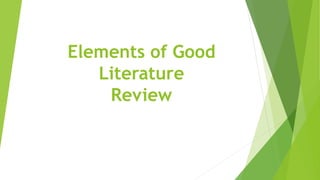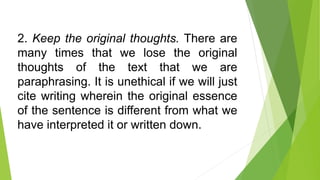Literature Review Practical research q.pptx
- 3. Literature review provides background of the research. Bok on the other hand, instead of reading studies related to their research opted to have concrete experience of their research topic. Having a direct experience is good but of course you need to read other researches in order to understand their claims and findings.
- 4. Guidelines in crafting Literature Review
- 5. 1. Identify your variables. This is to determine what are your variables in your research. In short, you should know your topic (Minch, 2018).
- 6. 2. Use online or library sources. Literature review requires reading. If there is a nearby school or public libraries, you can go there to read their books related to your study.
- 7. 3. Analyzing the literature. On this part of literature review, you need to analyze what you have read. It requires you to evaluate the findings of the research.
- 8. 4. Summarizing what you read by highlighting important things. On this part, you need to summarize the literature you read. There are many ways of summarizing it.
- 9. Ways of Organizing Literature Review
- 11. 1. Categorize by variables. Ten (10) or more literatures that are comprised of books, journals, theses or dissertations, or online publication are hard to organize. In organizing them, you need to stick on the variables you have considered and they will be bases of your searching.
- 12. 2. Arrange by importance. After categorizing your literatures by variables, you need to arrange them by importance.
- 13. 3. Connecting literatures. After arranging the literatures that you searched, now it is time for you to connect them because these are already categorized and arranged.
- 16. 1. Literature review is intensive. The main purpose of literature review is to provide background of your research (Ramdhani, Ramdhani, & Amin, 2014).
- 17. 2. Literature review is concise. Literature review does not represent the entire claim of the research being reviewed. It is just a part of your research that provides information about the variables that you are exploring that were already explored by other researchers on their studies.
- 18. 3. Literature review is logical. Literature review has to be logical, analytical and rational. It is accomplished through deductive or inductive presentation.
- 19. 4. Literature review is complete. Saturation of the studies related to you research has to be practiced. It should not be based on the quota of literature you need to cite but on the relationship of previous researches to your research.
- 20. 5. Literature review is recent. The literature to be used have to be conducted within ten (10) years for it to be called recent. However, there are institutions that are requiring literature to be only within five (5) years.
- 21. Ethics in Literature Review
- 23. Ethics etymologically came from the Greek word ethos which means right action. In any society, standard action is ought to be followed. For example, if you go out, you need to wear facemask. If you will buy goods, you need to fall in queue. Aside from that, we respect elders, those in authority, and people around us.
- 24. 1. Observe proper citation. In writing academic text like research, you ought to observe proper citation. This is from proper paraphrasing to correct citation entry in different citations.
- 25. 2. Keep the original thoughts. There are many times that we lose the original thoughts of the text that we are paraphrasing. It is unethical if we will just cite writing wherein the original essence of the sentence is different from what we have interpreted it or written down.
- 26. 3. Avoid biases. As a novice researcher, it is important that you eliminate personal interest or biases on your studies (Fleming & Zegwaard, 2018). You should be fair, not one sided.
- 27. 4. Be scientific. Becoming scientific is to have strong basis on reviewing literature. One has to state only what is written and provided evidence alone not on personal and intuitive deductions of interpretation.
- 28. 5. Embrace positivism. Research is always geared towards positivity. Thus, the literature review has to be in line with positivism (Polonski, 2004).
- 29. 1. What is the word that refers to right action? 2. What do you commit when you write something that is only favoring only one side? 3. In literature review, what do you use to give credit to the original author of the idea? 4. In writing literature review, what do you call when you provide strong basis or evidence to your claim? 5. What is the word that refers to positive and affirmation action toward others study?




























